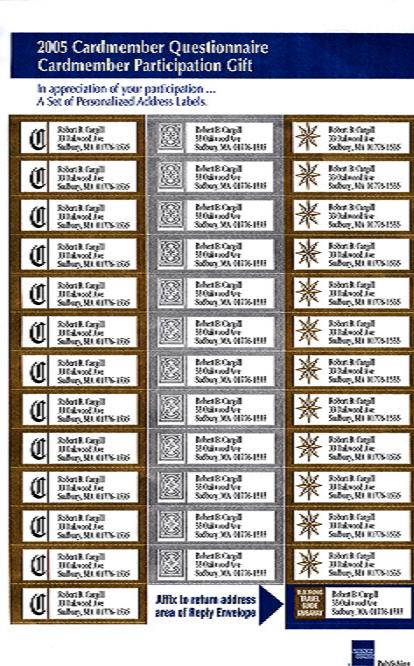Direct mail marketers rely on a host of techniques to get people to open, read and respond to their communications, but perhaps no other as obvious – and effective – as the practice of giving away something for nothing.
Indeed, whether it’s actually included in the mail piece or promised on the back end, a so-called premium – such as a free decal or t-shirt – more often than not improves response and pays for itself.
This is no secret to direct response fundraisers, of course. In fact, most studies suggest that more than half of all direct mail solicitations sent by nonprofit organizations make use of premiums in some way, shape or form.
A premium helps an organization command the attention of constituents who might otherwise not give it the time of day.
A premium gives a mailing a high perceived value, leading donors and prospects to lend their financial assistance not just out of generosity, but out of guilt as well.
There are countless premiums from which nonprofits can choose to use as incentives to give, but the most ubiquitous of them all appears to be the name and address label.
In just the past couple of months alone, I have seen more than a handful of label packages in the mail from such organizations as the American Heart Association, The Humane Society of the United States, The Greater Boston Food Bank, the March of Dimes, the Cystic Fibrosis Foundation, the United States Olympic Committee and the Anti-Defamation League, just to name seven.
Yes, everyone loves labels, both the senders and those on the receiving end. That’s why they continue to be used so heavily – and successfully – in the nonprofit world. And perhaps why direct marketers on the commercial side, too, seem to be catching on to their tendency to boost response.
For instance, included in a large, 9” x 12” direct mail package I received earlier this year from American Express Publishing (promoting SkyGuide, a “reference guide for the busy traveler”) was a handsome set of personalized name and address labels (below) for me to keep and use on my own outgoing mail.

The company went so far as to use one of these labels as an “involvement device,” asking me to affix it to the return address area of the enclosed business reply envelope, a clever way of jumpstarting the ordering process.
But that’s nothing compared to how creatively Maker’s Mark Bourbon Whisky uses labels as a way of involving potential customers in a full-page ad (below) in the December issue of Esquire magazine.

“In this electronic age of Internet and e-mail, you can share your thoughts with friends at the speed of light,” reads the text of the ad. “There are times, though, when sending a letter shows you care enough to actually sit down and put pen to paper. Taking time to do things right. It’s the way we craft each bottle of Maker’s – slowly and by hand.”
“So here’s a way of combining your love of keeping in touch with your friends with your love of Maker’s Mark,” the text continues. “Sign up as one of our ambassadors, and we’ll ship you a set of customized return address labels. Each label will prominently display your name, plus the classic Maker’s ‘red-wax’ logo design.”
Maker’s Mark even suggests how to use the labels, adding, “You can stick them on cards, letters, phone company bills and discreetly on your friends’ backs. Folks across the country (maybe even your pen pals overseas) will know you take pride in spreading the word about the bourbon handcrafted in small batches.”
Maker’s Mark knows that labels can not only give your response a lift, they can also serve as an inexpensive, albeit powerful, viral marketing tool, helping you extend the reach of your brand.
Indeed, whether you’re a nonprofit or not, consumers love labels so much they’ll not only part with their hard-earned money — in support of your products and services — for them, they may even do some of your advertising for you, giving you back much more in goodwill than you could ever give away in such tchotchkes.
Google+ Follow
Follow



Regarding the Maker’s Mark ad in Esquire: did you notice that the doublesided ad had logo stickers on the front side? One critical flaw of this ad: the small type says “please allow 4-6 weeks for delivery.” Now that people are accustomed to the immediacy of online communications and commerce, this slow fulfillment time period is no longer acceptable. This seems to be a problem plaguing other companies too. I was at a Forrester Research seminar a few weeks ago where we studied a really interesting online campaign for a consumer electronics company – but they similarly dropped the ball on the execution – the freebie offer also said “allow 4-6 weeks for delivery.” Companies need to revamp their physical fulfillment processes so that they’re more in line with the speed and turnaround of online marketing. I think most consumers would expect to get their free gift in about a week. And they would be “suprised and delighted” at this quick turnaround too.